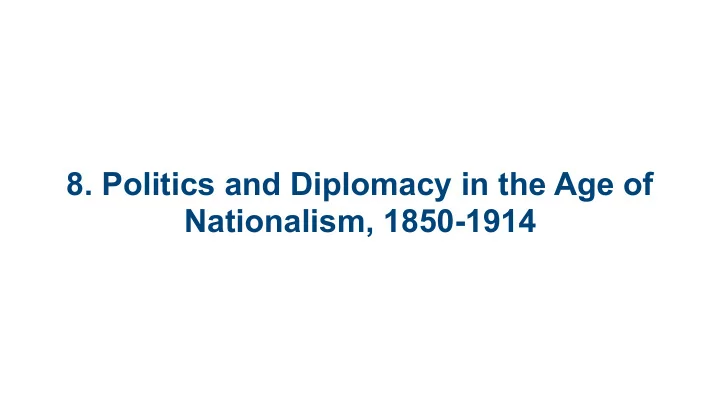

8. Politics and Diplomacy in the Age of Nationalism, 1850-1914
8.1 The Unification of Italy and Germany 8.2 Austria-Hungary 8.3 Russia 8.4 France 8.5 Socialism and Labor Unions 8.6 European Diplomacy, 1871-1900
8.1 The Unification of Italy and Germany
Italy: • 1848 Revolutions • Charles Albert • Giuseppe Garibaldi
Italy: • Count de Cavour • Piedmont-Sardinia • Victor Emmanuel II
Italian Wars of Unification • Second Italian War of Independence (1859) • Creation of Italy (1861) • Third Italian War of Independence (1866) • Rome?
Germany: • 1848 Revolutions • Frankfurt Parliament
Germany: • Otto von Bismarck • Prussia • William I • “Blood and Iron”
German Wars of Unification • War of Schleswig- Holstein (1859) • Austro-Prussian War (1866) • Franco-Prussian War (1871)
German Wars of Unification • War of Schleswig- Holstein (1859) • Austro-Prussian War (1866) • Franco-Prussian War (1871) • Rome?
8.2 Austria-Hungary
Austria: • 1848 Revolutions • Emperor Franz Joseph
• Austro-Prussian War (1866) • Austro-Hungarian Compromise of 1867
Austria-Hungary • Dual Monarchy • Expansion into the Balkans • 1908 Annexation of Bosnia-Herzegovina
8.3 Russia
Prior to 1850: • Decembrist Revolt (1825) • Nicholas I • Orthodoxy, Autocracy, Nationalism • Polish Uprising (1830) • 1848?
Alexander II Reforms • Serfdom Abolished (1861)
Alexander II Reforms • Serfdom Abolished (1861) • Judicial and Penal reform • Local Self- Government ( zemstvo ) • Universal Conscription (1874)
• Crimean War (1853-1856) • Russo-Turkish War (1877-1878) • Treaty of San Stefano • Bulgaria • Congress of Berlin of 1878
• Crimean War (1853-1856) • Russo-Turkish War (1877-1878) • Treaty of San Stefano • Bulgaria • Congress of Berlin of 1878 • Pan-Slavism
• Narodnaya Volyva (“People’s Freedom”) • Assassination of Alexander II (1880)
8.4 France
• 1848 Revolution • Party of Order – Louis Napoleon • Napoleon III
Foreign Policy • Crimean War (1856) • Italy (1859) • Colonial Empire • Maximillian III and Mexico • Southeast Asia • Franco-Prussian War (1871) • Siege of Sedan • Second Republic
8.5 Socialism and Labor Unions
1) Types of Socialism • Socialist Parties • Utopian Socialism • Anarchism • Communism 2) Common Features • Cooperation > Competition • Anti-Private Property
Communism: Origins • Karl Marx and Friedrich Engels • Communist Manifesto (1848)
Communism: Beliefs • Capitalism contains seeds of own destruction • “Workers of the World Unite” • Revolution NOT Reform
“From each according to his ability to each according to his needs” – Karl Marx
Socialist Parties • Labour Party (Britain) • Social Democratic Party (Germany) • Labor Unions • Bismarck’s Social Insurance
8.6 European Diplomacy, 1871-1900
Foreign Policy 1) The Eastern Question 2) Imperial Conquest 3) Alliance System
The Eastern Question • Crimean War (1856) • Russo-Turkish War (1877) – Treaty of San Stefano • Congress of Berlin (1878)
Imperial Conquest • Imperialism in Africa and Asia • Russia and India • Fashoda Crisis – Entente Cordiale (1904)
Alliance System: Pressures • Franco-Prussian War (1871) • Russia and India • Fashoda Crisis – Entente Cordiale (1904) • Wilhelm II and Weltpolitik
Alliance System: Solidified • League of the Three Emperors (1887) • Reinsurance Treaty (1887-1890) – Bismarck Dismissed • Franco-Russian Alliance (1894) • Anglo-German Naval Race • Triple Alliance (1892) • Triple Entente (1907)
Recommend
More recommend